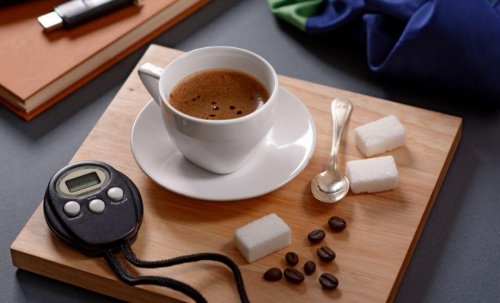How to Avoid Dehydration

Water is a basic and elemental component for our bodies. Its presence is so important that one’s life could be at risk if lost liquids aren’t replenished. While practicing sports, as well as in other specific situations, avoiding dehydration is a must.
Water makes up around 70 percent of our bodies, so when that percentage is out of balance, we’re at risk of suffering from dehydration. This occurs when we consume less water than we expel.
The expulsion of fluids from our bodies takes place in different ways: sweating, urination, vomiting, and diarrhea. Fever and diabetes can also cause our bodies to lose considerable amounts of water.

Water is necessary in our bodies for a large number of chemical reactions. In addition, it plays a central role in transporting nutrients and allowing body temperature to adjust, since this is accomplished through sweating.
Risk groups that should avoid dehydration
When it comes to avoiding dehydration, there are some groups of people that we need to pay close attention to. This includes senior citizens and is due to the normal deterioration of their thermoregulation mechanisms. Children, who rely on adults for their basic care; and sick people, who usually suffer significant water loss.
Similarly, athletes and pregnant and lactating women should especially stay hydrated and be alert to the onset of symptoms. In times of extreme heat, everyone should take precaution.
Symptoms of dehydration
Dehydration sends very clear signals to the body so that you can recognize a lack of fluids as soon as possible. Some of these signals are:
- Thirst
- Changes in urine color
- Fatigue
- Headaches
- Dry mouth
- Dry eyes
- Reduced sweating
- Muscle cramps
- Dizziness, nausea, and vomiting
- Palpitations

Ignoring any of these symptoms could cause severe dehydration, which can put our lives at risk. The most basic of them, thirst, is already an indicator that our body needs water. In fact, we shouldn’t even wait until we’re thirsty to start drinking liquids.
Also, we must not overlook any changes in urine, another symptom of dehydration. If we are well hydrated, our urine should be clear; if you are dehydrated, it begins to take on a dark tone.
Finally, it should be noted that although sweating may be annoying and unpleasant, it’s very important. If you stop sweating during physical exercise, drink water immediately.
Tips to avoid dehydration
The most effective measure that any individual can take to avoid dehydration is to drink liquids—especially water—constantly. The recommended amount of water intake per day is between two and four and five pints. Once again, it’s necessary to clarify that you shouldn’t wait until you feel thirsty to drink water.
Furthermore, it’s essential to drink water before, during, and after all physical activity. On hot days, you should also avoid excessive exposure to sunlight, and if you can’t, keep yourself constantly hydrated.
- Avoid drinking too much tea and/or coffee, since caffeine facilitates dehydration.
- Include vegetables with high water content in your diets, such as lettuce, tomatoes, lemons, peppers, and green leafy vegetables.
- Consume fruits that contain water: watermelons, cucumbers, and oranges are some examples.
- Combine the consumption of water with other liquids, such as soft drinks (without sugars), or infusions, to make the habit more bearable and varied.

Home remedies for dehydration
Regarding our tips to avoid dehydration, there are some useful recipes that are easy to prepare. Here are two of our favorites:
- Serve four pints of water in a jug, and add 8 teaspoons of sugar and 1 teaspoon of salt. Mix well and sip throughout the day.
- For the second preparation, we should take 2 tablespoons of milk curd and add one pint of water and salt to taste. Then, mix it well to form buttermilk and add half a teaspoon of dried ginger powder. Drink this two to four times a day.
Fortunately, we live in a region of the world where water is a right and not a privilege. It may seem basic, but it’s an indispensable element in our lives; we have to make proper use of it.
Water is a basic and elemental component for our bodies. Its presence is so important that one’s life could be at risk if lost liquids aren’t replenished. While practicing sports, as well as in other specific situations, avoiding dehydration is a must.
Water makes up around 70 percent of our bodies, so when that percentage is out of balance, we’re at risk of suffering from dehydration. This occurs when we consume less water than we expel.
The expulsion of fluids from our bodies takes place in different ways: sweating, urination, vomiting, and diarrhea. Fever and diabetes can also cause our bodies to lose considerable amounts of water.

Water is necessary in our bodies for a large number of chemical reactions. In addition, it plays a central role in transporting nutrients and allowing body temperature to adjust, since this is accomplished through sweating.
Risk groups that should avoid dehydration
When it comes to avoiding dehydration, there are some groups of people that we need to pay close attention to. This includes senior citizens and is due to the normal deterioration of their thermoregulation mechanisms. Children, who rely on adults for their basic care; and sick people, who usually suffer significant water loss.
Similarly, athletes and pregnant and lactating women should especially stay hydrated and be alert to the onset of symptoms. In times of extreme heat, everyone should take precaution.
Symptoms of dehydration
Dehydration sends very clear signals to the body so that you can recognize a lack of fluids as soon as possible. Some of these signals are:
- Thirst
- Changes in urine color
- Fatigue
- Headaches
- Dry mouth
- Dry eyes
- Reduced sweating
- Muscle cramps
- Dizziness, nausea, and vomiting
- Palpitations

Ignoring any of these symptoms could cause severe dehydration, which can put our lives at risk. The most basic of them, thirst, is already an indicator that our body needs water. In fact, we shouldn’t even wait until we’re thirsty to start drinking liquids.
Also, we must not overlook any changes in urine, another symptom of dehydration. If we are well hydrated, our urine should be clear; if you are dehydrated, it begins to take on a dark tone.
Finally, it should be noted that although sweating may be annoying and unpleasant, it’s very important. If you stop sweating during physical exercise, drink water immediately.
Tips to avoid dehydration
The most effective measure that any individual can take to avoid dehydration is to drink liquids—especially water—constantly. The recommended amount of water intake per day is between two and four and five pints. Once again, it’s necessary to clarify that you shouldn’t wait until you feel thirsty to drink water.
Furthermore, it’s essential to drink water before, during, and after all physical activity. On hot days, you should also avoid excessive exposure to sunlight, and if you can’t, keep yourself constantly hydrated.
- Avoid drinking too much tea and/or coffee, since caffeine facilitates dehydration.
- Include vegetables with high water content in your diets, such as lettuce, tomatoes, lemons, peppers, and green leafy vegetables.
- Consume fruits that contain water: watermelons, cucumbers, and oranges are some examples.
- Combine the consumption of water with other liquids, such as soft drinks (without sugars), or infusions, to make the habit more bearable and varied.

Home remedies for dehydration
Regarding our tips to avoid dehydration, there are some useful recipes that are easy to prepare. Here are two of our favorites:
- Serve four pints of water in a jug, and add 8 teaspoons of sugar and 1 teaspoon of salt. Mix well and sip throughout the day.
- For the second preparation, we should take 2 tablespoons of milk curd and add one pint of water and salt to taste. Then, mix it well to form buttermilk and add half a teaspoon of dried ginger powder. Drink this two to four times a day.
Fortunately, we live in a region of the world where water is a right and not a privilege. It may seem basic, but it’s an indispensable element in our lives; we have to make proper use of it.
All cited sources were thoroughly reviewed by our team to ensure their quality, reliability, currency, and validity. The bibliography of this article was considered reliable and of academic or scientific accuracy.
- Mikolášek, P. (2018). Dehydration. Pediatrie pro Praxi. https://doi.org/10.1016/B978-0-12-398530-9.00012-7
- Sawka, M. N., & Noakes, T. D. (2007). Does dehydration impair exercise performance? Medicine and Science in Sports and Exercise. https://doi.org/10.1249/mss.0b013e318124a664
- Adan, A., & Adan, A. (2012). Cognitive performance and dehydration. Journal of the American College of Nutrition. https://doi.org/10.1080/07315724.2012.10720011
- Hooper, L., Bunn, D., Jimoh, F. O., & Fairweather-Tait, S. J. (2014). Water-loss dehydration and aging. Mechanisms of Ageing and Development. https://doi.org/10.1016/j.mad.2013.11.009
This text is provided for informational purposes only and does not replace consultation with a professional. If in doubt, consult your specialist.








